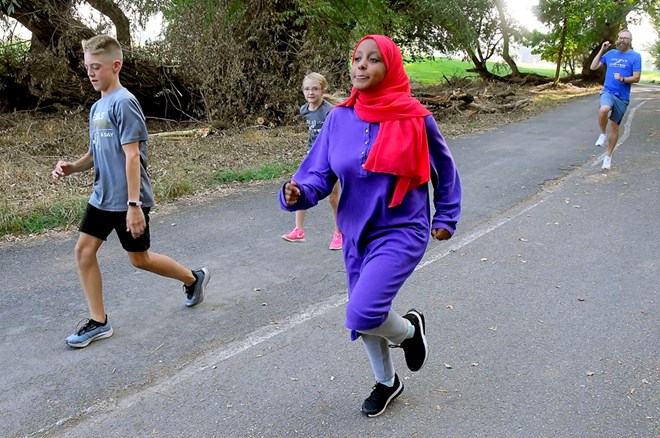The Herald Journal
Sunday October 11, 2020
By Kat Webb

Ubah Yusuf, center, runs with volunteers in the Athletics United program, Monday, Oct. 5, 2020, in Logan, Utah. (Eli Lucero/The Herald Journal via AP)
Logan • Local officials and educators have been concerned about the effects of COVID-19-related shutdowns and closures on children’s' education. But according to local advocates, it’s been hardest for those who were already struggling to begin with: local refugees and immigrants.
“Under normal circumstances, refugee children are disadvantaged,” said Halima Ali, an organizer and advocate for the Somali refugee community. “Their parents are new in the country, and they lack familiarity with our education system. In some cases, the parents had no formal education. So COVID-19 made that situation worse.”
While Ali and her family immigrated from Somalia well before the pandemic, she said it was a struggle to adjust, and for families where parents received no formal education, it can be even worse.
This was the case for Salman Yusef, whose family immigrated to Utah in 2018.
“When I came here, I didn’t know how to read and write,” he said. “And I was learning, but then COVID-19 came. And it still is hard for me to read and write.”
But local nonprofit Athletics United helped him find his footing both on the track and in the classroom. What started as a local running club to unite the community and get kids active outdoors morphed when founders Mike and Kristi Spence identified many of the kids needing additional help with schoolwork.
The twice-weekly tutoring sessions held at the Logan Library were halted in March due to the pandemic, and the library has yet to allow private groups back into the space in order to comply with virus-mitigation efforts.
Like every other industry, the nonprofit had to get creative to adapt to physical distancing.
“The last three years have been crucial relationship building time that’s allowed us to use word-of-mouth and the friendships that we’ve already established to help out with individual needs,” Spence said. “And so that’s what we’re focusing on right now.”
Language barriers are the basis of many problems — such as with Yusef, whom Spence helps weekly since teachers are already spread too thin.
“Teachers sometimes are not available for you, because they’ve got meetings,” he said. “They got other things to do, too. You can’t really stay after school because of the COVID-19 stuff … but before, when we needed to get help after school but it was not enough, you would still get help from the program.”
According to Frank Schofield, the superintendent at Logan City School District, the push to get students in the classroom to build relationships with teachers was critical to build trust — similar to how Athletics United has been in the community for years and proved to be a resource for refugees and immigrants, or anyone who needed help.
“If we don’t have in-person, face-to-face learning, we know that those challenges are greater for those families because of a lack of access to technology in many cases,” Schofield said.
But even with technology and providing students computers and tablets, the system is not infallible.
Yusef’s cousin Mowlid Nur has been with the group since the nonprofit was an informal club. The two attend Logan High School together and said depending on the teacher, extra help can be difficult to find.
“It’s just always, 'If you have any question or anything, send me an email,” Nur said. “It’s only through email, and when I email, you never know how long they might take them to respond. It might take days, hours, minutes, however long, and it depends on your teacher.”
Yusef’s niece Sabrin, goes to Thomas Edison Charter School-South, and she said while it was a similar struggle at first, the school was able to hire two new tutors to help.
In the past four weeks, Spence has started up more informal running groups. While the club used to meet at Ellis Elementary, Spence and several volunteers meet at 4:30 p.m. twice a week, Mondays at the Logan River Trail and Thursdays at Logan High School, to give the kids something to look forward to and a bit of contact in as safe a setting as possible.
And while losing access to the library was a hard turn for the group over the summer, Spence said it could be even more detrimental this winter if there is no indoor space for the group to gather.